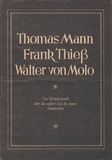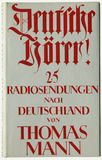Flier brochure Die andere Seite [The other side] (Number 3, 1943)
Flier brochure Die andere Seite [The other side] (Number 3, 1943)
Freiheit und Menschenwürde dürfen nicht untergehen. Die Vereinigten Nationen können nicht abstehen von ihrem Ziel, die Nazigeissel zu brechen und dem deutschen Nationalismus und Rassengrößenwahn überhaupt ein Ende zu machen.
[Freedom and human dignity cannot be allowed to perish. The unified nations cannot waver from their goal of breaking the Nazi scourge and putting an end once and for all to German nationalism and racial delusions of grandeur. (ed. trans.)]
Thomas Mann, Die apokalyptischen Lausbuben, 1943
The pamphlet Die andere Seite was published from 1942 by British war propaganda in collaboration with German emigrants. Four issues appeared by the end of 1943. Royal Air Force bombers dropped hundreds of thousands of issues over the German Reich. In addition to documents about the course of the War and eye-witness accounts of the crimes of the SS and the Wehrmacht, Die andere Seite also contained texts by émigré writers such as Thomas Mann and Bertolt Brecht. Exile and author Martin Beheim-Schwarzbach (pseudonym: Christian Corty) worked at the London editorial office.
Thomas Mann's short piece Die apokalyptischen Lausbuben was included in issue three of the pamphlet brochure in 1943. The text was a written version of one of the monthly radio addresses that the writer gave for the British radio service BBC beginning in autumn 1940. In view of the looming military defeat of the NS state, the Nobel laureate cautioned the Allies not to accept peace overtures from the Hitler government but to fight resolutely for the liberation of Europe. The apocalyptic-sounding verbal threats from the Nazi propaganda minister Goebbels which were the object of the piece’s title were described by Mann as an expression of bottomless hubris.



